Sex Workers Slammed by the Pandemic Say City Council Aid Misses the Mark | The City
Markey, Kennedy support decriminalizing sex work at justice-focused forum | The Boston Globe
Miami sex workers were already living at the margins. COVID-19 made it worse. | Miami Herald
The Senate Might Pass a Bill That Could Eliminate Your Internet Privacy | betches.com
DSW Takes Action Against EARN IT
July 22, 2020
In our last newsletter, DSW reported on how the EARN IT Act, a bill that recently advanced out of the U.S. Senate Judiciary Committee, threatens the very heart of online security and privacy. The legislation claims to go after the online sexual abuse of minors. In a world that is quickly digitizing — and becoming even more dependent on internet security as the coronavirus pandemic forces businesses, healthcare facilities, schools, and other institutions to move online — the EARN IT Act is a sneak ban on encryption that, in reality, does not make anyone safer. Watch DSW’s animation on how the EARN IT Act, now on the Senate floor, would curtail end-to-end encryption and end internet privacy as we know it.
EARN IT would amend Section 230 of the Communications Decency Act, which protects online service providers from liability for content posted by their users. That immunity blocks most civil lawsuits and criminal charges under state law (except for sex trafficking) but maintains the tenants of federal regulations.
Under the EARN IT Act, the only way to maintain immunity is for the provider to comply with censorship “best practices” for fighting online sexual exploitation of minors. While this is a critical cause, these best practices would be developed by an “unelected, unaccountable 19-member commission headed by the attorney general, who would have the authority to approve or reject them,” according to Riana Pfefferkorn of the Stanford Center for Internet and Society. These guidelines would then bypass legally mandated deliberative processes to be quickly approved by congress.
Vulnerable people would be more at risk under the EARN IT Act’s mandates. Experts from Human Rights Watch, the ACLU, the Brookings Institution, and more charge that this legislation inappropriately goes after tech companies to solve a problem requiring a holistic social, policy, and enforcement solution. This approach would endanger the security of children, the rights of marginalized groups, and society in general.
DSW Newsletter #17 (August 2020)
Hero(es) of the Month: TS Candii, SX Noir, and Gizelle Marie Organize the Largest Sex Worker March in U.S. History
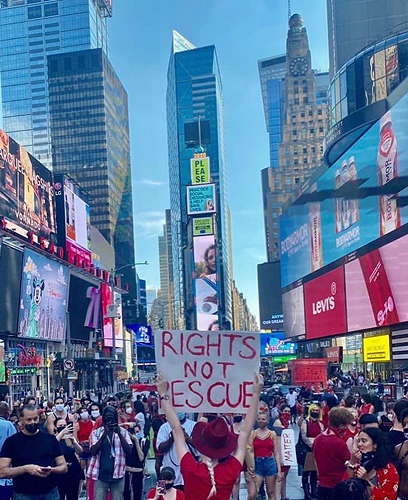
MA Democratic Senate Candidates Are Listening to Sex Workers

NY Senate Fails Trafficking Survivors, Again

DSW’s Kaytlin Bailey on Sex Work and Police Reform

DSW Takes Action Against EARN IT

The Stripper Strike Goes National

 Hero(es) of the Month: TS Candii,...
Hero(es) of the Month: TS Candii,...
 MA Democratic Senate Candidates Are Listening...
MA Democratic Senate Candidates Are Listening...
 NY Senate Fails Trafficking Survivors, Again
NY Senate Fails Trafficking Survivors, Again
 DSW’s Kaytlin Bailey on Sex Work...
DSW’s Kaytlin Bailey on Sex Work...
 DSW Takes Action Against EARN IT
DSW Takes Action Against EARN IT
 The Stripper Strike Goes National
The Stripper Strike Goes National
DSW Newsletter Archive
EARN IT Act Is a Wolf in Sheep’s Clothing
New animation shows how the EARN IT Act, now on the Senate floor, will curtail end-to-end encrypted messages, ending internet privacy as we know it.
NEW YORK, NEW YORK – July 22 – The Eliminating Abusive and Rampant Neglect of Interactive Technologies Act of 2020, also known as the EARN IT Act, by a unanimous vote of the Senate Judiciary Committee, has moved to the Senate floor. The bill was originally introduced by Republican Sen. Lindsey Graham of South Carolina. If this dangerous bill becomes law, it will end private communication on the internet.
The EARN IT Act is part of a long history of using sex panics to expand state power. If we fall for it this time we may effectively end freedom of expression and open communication on the internet as we know it. To raise awareness of this wolf in sheep’s clothing, Decriminalize Sex Work, a national advocacy organization, has released a new animated short:
EARN IT threatens website providers’ and other intermediaries’ ability to provide end-to-end encrypted services. End-to-end encryption is critical to ensuring private communication and often personal safety.
“Do voters really want the government snooping into their most private communication, with therapists, journalists, or intimate friends?” asks Kaytlin Bailey, Communications Director for Decriminalize Sex Work. “It’s easy to imagine how Trump’s DOJ will abuse these new surveillance tools to attack whistleblowers, protestors, and adult consensual sex workers.”
End-to-end encryption allows journalists to communicate about sensitive issues with sources, allows doctors to communicate with patients, and allows the average person to share sensitive financial information with trusted people. EARN IT can destroy all of this by exposing web platforms to an “enormous number of lawsuits in which they will potentially face liability for their choice to protect users’ privacy and security through end-to-end encryption (E2EE),” according to Emma Llansó with the Center for Democracy & Technology. “Prosecutors and civil litigants will point to the encrypted status of an intermediary’s services as a relevant consideration in their claims, even for criminal and civil provisions with a ‘knowingly’ mens rea. Even if an intermediary successfully defends against a particular claim, the consistent threat of litigation, and challenge to their decision to employ encryption, will be a strong disincentive against providing E2EE and continuing to have to defend that decision in court.”
“We can learn from the damaging consequences of the 2018 Allow States and Victims to Fight Online Sex Trafficking Act (FOSTA) and Stop Enabling Sex Traffickers Act (SESTA),” says Bailey. “Donald Trump signed FOSTA-SESTA into law in April of 2018 to devastating effects. Rather than protecting children and victims of sex trafficking, this set of laws has made sex work more dangerous.”
Llansó writes, “The clear lesson from the SESTA-FOSTA debacle: When content hosts, website operators, social media services, search engines, and other intermediaries face increased legal risk for user-generated content, it is the users who end up suffering, a cost often borne by the most vulnerable.”
Like so many of the save-the-children bills before it, EARN IT will not combat child sexual exploitation, but it will be the largest expansion of state surveillance powers in recent history, eliminating private communication on the internet.
Decriminalize Sex Work
Decriminalize Sex Work is a national organization pursuing a state-by-state strategy to end the prohibition of consensual, adult prostitution in the United States. We work with local organizations, advocates, and lobbyists to build community support and convince legislators to stop prostitution-related arrests. Evidence shows that decriminalizing sex work will help end human trafficking, improve public health, and promote community safety.
Kaytlin Bailey
Communications Director
512-942-6078 Ext 1
[email protected]
DSW Supports Criminal Justice Reform Bills in New York
July 14, 2020
DSW’s Melissa Broudo and Frances Steele attended a rally in New York City supporting five state-level criminal justice reform bills that will be voted on — and hopefully passed — this legislative session. The rally featured impacted community members who shared personal experiences and state-wide data to explain the critical issues addressed by each bill. Over the past year, DSW has collaborated with local sex workers and LGB and TGNC rights groups to repeal the criminalization of Loitering for the Purpose of Prostitution in New York state (S2253 (Hoylman)/A654 (Paulin)). Also known as the Walking While Trans ban, this repeal was one of the five bills highlighted at the rally.
Walking While Trans disproportionately impacts transgender and cisgender women of color, criminalizing them for otherwise legal behavior based on the way they look. Manhattan District Attorney Cy Vance has stopped prosecuting the charge because of such discrimination. Last year, NYPD updated its patrol guide to stop targeting individuals on the basis of “gender, gender identity, clothing, and location.” Despite the fact that charges for Loitering for the Purpose of Prostitution were only brought in six New York counties in 2019, arrests increased by 120%. Of those arrested, 91% were people of color and 80% were women; 47% of the arrests occurred in Queens County alone.
Leaders of the New York City Council’s Women’s Caucus and LGBT Caucus submitted a letter, seeking a hearing for a resolution on the repeal of Walking While Trans. “Our laws need to reflect New Yorkers’ right to walk in public without fear of being profiled for their gender expression… As a Council, we cannot idly sit back and allow state law to further penalize and criminalize anyone on the basis of their clothing, gender expression, or gender identity,” the resolution reads.
Melania Brown, the sister of Layleen Polanco, a transgender woman who died of an epileptic seizure while in solitary confinement on Rikers Island last year, was one of the featured speakers. Layleen was arrested in April 2019 on assault charges and then held on a $500 bail for drug and prostitution charges from 2017. Unable to afford the bail, Polanco passed away two months later.
Together, the bills represent a road map to justice and decarceration in New York state. Each addresses a different facet of racial violence that routinely occurs within the U.S. prison system. The Fair and Timely Parole Act ensures that parole decisions are not racially biased and are based on who individuals are today, rather than who they were when they committed their offense. The Elder Parole Act seeks to end death-by-incarceration sentences in New York state by giving those who have served decades in prison the chance to be released. The HALT Solitary Confinement Act would end solitary in New York and replace it with more effective and humane alternatives. Lastly, the Protect Our Courts Act makes it illegal for ICE agents or law enforcement officers to arrest an individual for a civil violation who is going to, leaving, or attending court.
To help pass the repeal of Walking While Trans, text WALK to 50409. If you are a New York State resident you can also reach out to your State Senator or Assemblymember and urge them to vote on and pass this critical package of bills.

Melissa Broudo (left) and Frances Steele (right) listen to speakers at a rally in New York City. (Photo: DSW, 2020)
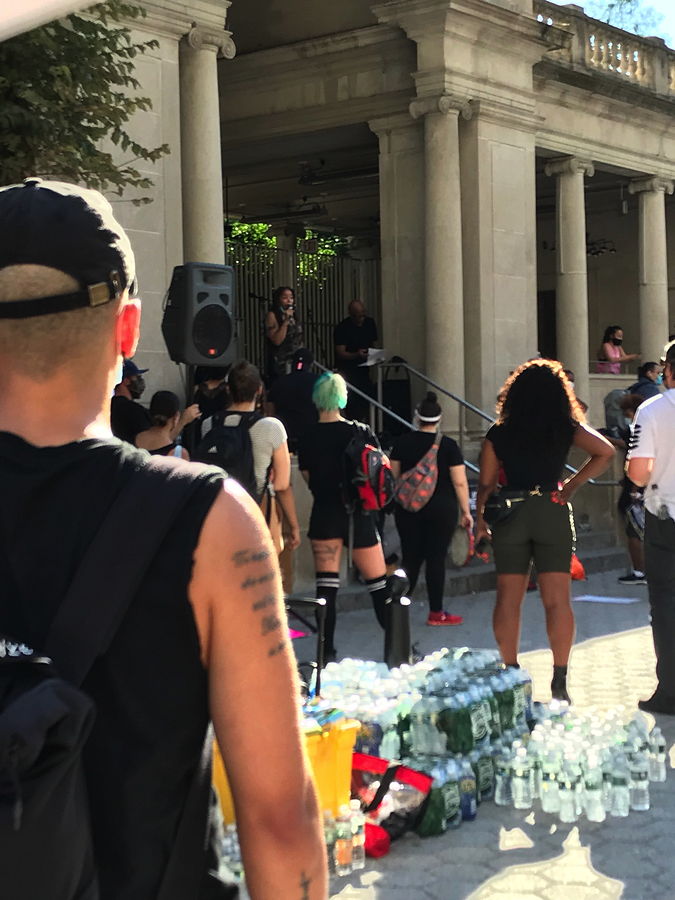
Melania Brown, sister of Layleen Polanco, calls for an end to police brutality and justice for transgender women. (Photo: DSW, 2020)
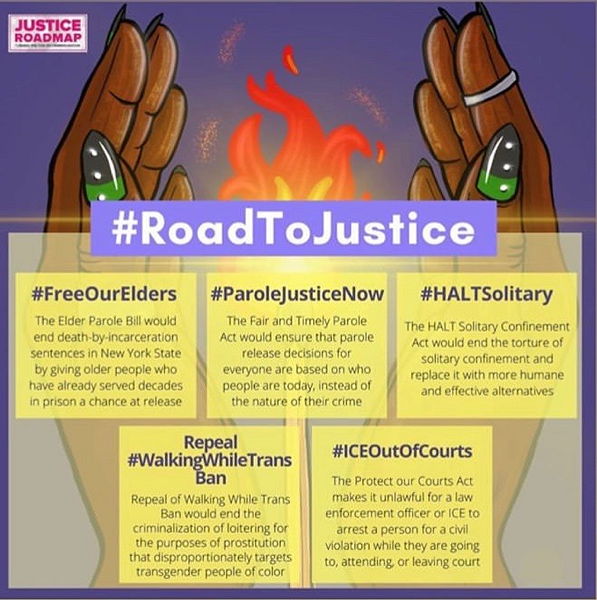
The rally supported five criminal justice bills to provide a #RoadMaptoJustice in New York state. DSW Supports a Rally for Criminal Justice Reform in New York State. (Photo: Brooklyn Defender Services/Instagram, 2020)

DSW Newsletter #16 (July 2020)
Hero of the Month: Portland-based stripper and sex worker rights activist Cat Hollis is demanding fair treatment for Black sex workers

A New Bill Threatening Free Speech and Online Security Passes the U.S. Senate Judiciary Committee

DSW Supports Criminal Justice Reform Bills in New York

A Victory Against Loitering Statutes in Seattle
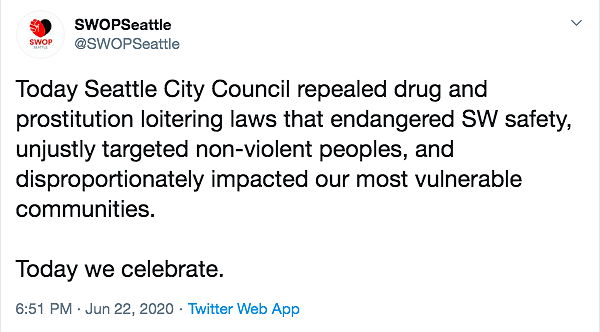
Fighting and Winning: Ceyenne Doroshow and the state of TGNCNB rights

 Hero of the Month: Portland-based stripper...
Hero of the Month: Portland-based stripper...
 A New Bill Threatening Free Speech...
A New Bill Threatening Free Speech...
 DSW Supports Criminal Justice Reform Bills...
DSW Supports Criminal Justice Reform Bills...
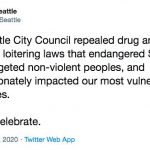 A Victory Against Loitering Statutes in...
A Victory Against Loitering Statutes in...
 Fighting and Winning: Ceyenne Doroshow and...
Fighting and Winning: Ceyenne Doroshow and...
DSW Newsletter Archive
‘We’re Fighting, and We’re Winning’: G.L.I.T.S. Founder Ceyenne Doroshow on Raising More Than $1 Million for the Black Trans Community | Vogue
A New Bill Threatening Free Speech and Online Security Passes the U.S. Senate Judiciary Committee
July 2, 2020
An amended version of the EARN IT Act, a dangerous federal bill that could effectively erase private communication online, unanimously passed the U.S. Senate Judiciary Committee. The passage of the bill sets the stage for a high-stakes floor vote, one that could fundamentally endanger free speech and security on the internet.
Proposed by U.S. Sen. Lindsey Graham (R–SC), the law would establish an unelected, 19-member commission to develop guidelines on prohibited content for online platforms to follow. If companies fail to meet set standards, legal immunity for content posted by third parties, protected by Section 230 of the Communications Decency Act, could be revoked. The bill’s provisions also threaten encryption, which protects online users from exploitation and surveillance by the government, companies, and other users. EARN IT subjects companies using end-to-end encryption to lawsuits, construing encryption as “recklessly” enabling the spread of child trafficking online.
The result would increase pressure on websites to censor sexual content, causing sex workers to lose access to online safety provisions and networks, income, and clientele; and, in the case of COVID-19, leading to a heightened public health risk. Under SESTA/FOSTA, sex workers have been barred from online platforms where they previously screened clients, shared critical safety and health information, and ensured secure payment. Law enforcement has also reported that, since the passage of SESTA/FOSTA, they have lost evidence and leads for many of the sex trafficking cases they were investigating using online tips. The EARN IT Act will only augment these harms.
Multiple human rights organizations, including the American Civil Liberties Union and Human Rights Watch, have challenged the efficacy of the bill’s provisions. The ACLU issued a letter charging that the law would instead “undermine the privacy of every single American, stifle our ability to communicate freely online, and may jeopardize the very prosecutions it seeks to enable.”
“The EARN IT Act falsely suggests that we must choose between protecting children and protecting other fundamental rights, including privacy and free expression,” says Hye Jung Han, child rights and technology researcher at Human Rights Watch. “But the [bill] fails to protect children from online exploitation while undermining their fundamental rights to freedom of expression, access to information, and privacy — during today’s crisis and beyond.”
In a Cato Daily Podcast episode released in March of this year, Eric Goldman, a leading expert on internet law and intellectual property, described how the EARN IT Act removes web platforms’ immunity from being sued for content posted by third parties. Ostensibly an attempt to crack down on material that victimizes young people, Goldman doubts the legislation would achieve its targeted goal. Instead, the bill endangers free speech and the security of online users, particularly those posting sexual content.

U.S. Sen. Lindsey Graham proposed the legislation in March of this year. (Photo: Tasos Katopodis/The Verge, 2020)
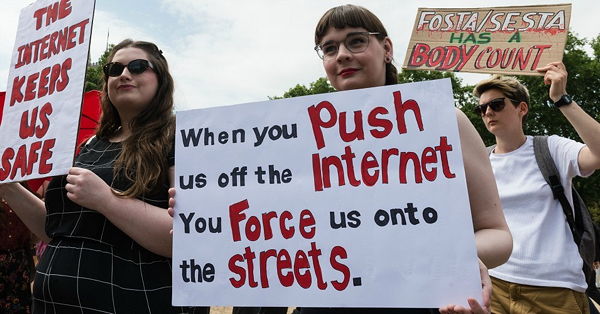
The same human rights experts and community activists who protested the passage of SESTA/FOSTA in 2018, including the ACLU, Human Rights Watch, and the Electronic Frontier Foundation, are speaking out against the EARN IT Act. (Photo: Wiktor Szymanowicz/Barcroft Media, 2020)

Eric Goldman is a professor at Santa Clara University School of Law where he co-directs the High Tech Law Institute and co-supervises the law school's Privacy Law Certificate. (Photo: Eric Goldman, 2020)
DSW Newsletter #16 (July 2020)
Hero of the Month: Portland-based stripper and sex worker rights activist Cat Hollis is demanding fair treatment for Black sex workers

A New Bill Threatening Free Speech and Online Security Passes the U.S. Senate Judiciary Committee

DSW Supports Criminal Justice Reform Bills in New York

A Victory Against Loitering Statutes in Seattle

Fighting and Winning: Ceyenne Doroshow and the state of TGNCNB rights

 Hero of the Month: Portland-based stripper...
Hero of the Month: Portland-based stripper...
 A New Bill Threatening Free Speech...
A New Bill Threatening Free Speech...
 DSW Supports Criminal Justice Reform Bills...
DSW Supports Criminal Justice Reform Bills...
 A Victory Against Loitering Statutes in...
A Victory Against Loitering Statutes in...
 Fighting and Winning: Ceyenne Doroshow and...
Fighting and Winning: Ceyenne Doroshow and...
